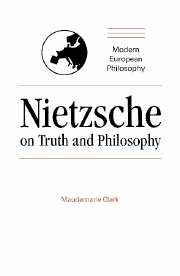Book contents
- Frontmatter
- Contents
- Preface
- Note on texts and citations
- Chapter 1 Interpreting Nietzsche on truth
- Chapter 2 Nietzsche and theories of truth
- Chapter 3 Language and truth: Nietzsche's early denial of truth
- Chapter 4 The development of Nietzsche's later position on truth
- Chapter 5 Perspectivism
- Chapter 6 The ascetic ideal
- Chapter 7 The will to power
- Chapter 8 Eternal recurrence
- Bibliography
- Index
Chapter 8 - Eternal recurrence
Published online by Cambridge University Press: 04 December 2009
- Frontmatter
- Contents
- Preface
- Note on texts and citations
- Chapter 1 Interpreting Nietzsche on truth
- Chapter 2 Nietzsche and theories of truth
- Chapter 3 Language and truth: Nietzsche's early denial of truth
- Chapter 4 The development of Nietzsche's later position on truth
- Chapter 5 Perspectivism
- Chapter 6 The ascetic ideal
- Chapter 7 The will to power
- Chapter 8 Eternal recurrence
- Bibliography
- Index
Summary
It is certainly not the least charm of theory that it is refutable; it is precisely thereby that it attracts subtler minds. It seems that the hundred-times-refuted theory of the “free-will” owes its persistence to this charm alone; again and again someone comes along who feels he is strong enough to refute it (BG 18).
Substantial agreement exists that Nietzsche considered the eternal recurrence his most important teaching. He calls it the “fundamental conception” of Zarathustra, which he celebrates as “the highest book there is … also the deepest, born out of the innermost wealth of truth” (EH III, Z 1; P 4). And he identifies himself in a special way with its teaching when summing up his philosophical intentions and achievements in one of his last books: “I, the last disciple of the philosopher Dionysus – I, the teacher of the eternal recurrence” (TI X, 5). If it is his central teaching, however, it is also the most frequently and effectively criticized of Nietzsche's doctrines. The body of philosophically sophisticated and interesting criticism of the doctrine of eternal recurrence remains unmatched by the literature on any other aspect of Nietzsche's philosophy. I will organize my interpretation of eternal recurrence as a response to the most important objections that have been raised against it.
- Type
- Chapter
- Information
- Nietzsche on Truth and Philosophy , pp. 245 - 286Publisher: Cambridge University PressPrint publication year: 1991



